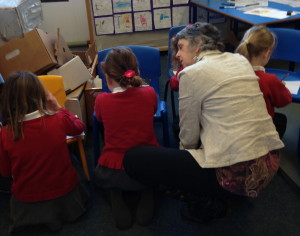What a great way to spend a morning! We were back in the classroom with years R to 2 demonstrating activities which encourage young children to engage with deep thinking. We had a lovely time with children discussing and offering their ideas, they very quickly grasped the importance of using the word BECAUSE to explain their reasoning. We were made very welcome by the staff in this North Norfolk school and had a good discussion over lunch about this way of working and exploring ways to push the children on further.
Here is some of the feedback from this session:
“Couldn’t be bettered… for me it was immensely useful.”
“I found the session fascinating – the level of thinking of the children surprised me.”
“It was good to see children offering their ideas, especially some of the quieter children.”

